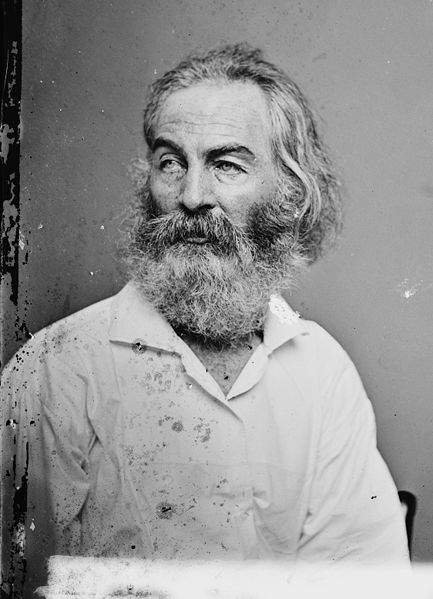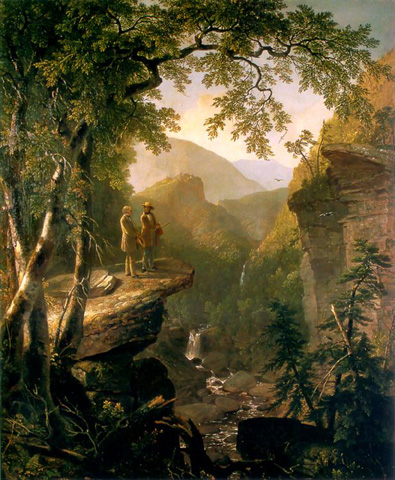We can boldly advance into the future with the visionary gifts that artists and poets alone possess. Or we can choose to hang back with the dead, blind culture of the old order. I suspect we will choose life. Let us unashamedly honor the strengths and virtues of our nation and encourage our own recognition of them. Let us begin this great task by enlisting gifted artists to help us see once again.We can draw on Coopers argument and broaden the base of support for the arts without alienating its regular patrons. What I've tried to do as a writer and a poet, is take Walt Whitman's vision out of its time and place in the nineteenth century, bring it through the awful truth of the twentieth century, and set it down into the twenty-first century to restore hope and faith in both our human nature and our democratic society. Furthermore, I believe this vision is supported by and anticipates developments in scientific fields such as neuroscience and evolutionary biology.
Tuesday, November 30, 2010
The Perfect Wave Project: Healing the Cultural Divide
To heal the political divide that afflicts our country, we must first heal the cultural divide. That's the assertion of James F. Cooper, author of Knights of the Brush: The Hudson River School and the Moral Landscape. In the culture wars, he is an art critic that I expect would be viewed as one who swings to the right. But he takes issue with conservatives that would defund the arts; quite the opposite, as his concluding remarks state in the following excerpt:
Tuesday, November 23, 2010
New York Times Editorial
From New York Times columnist David Brooks, here's a link to a sobering editorial about the state of our country. But as Brooks asserts, other forces are at work to get our country back on track. What I've tried to do as a writer and a poet, is 'translate' Whitman's vision out of its time and place in the nineteenth century, bring it through the horrors of the twentieth century, and provide it in the twenty-first century to enable the hope and faith in both our human nature and our democratic society.
Tuesday, November 16, 2010
The Perfect Wave Project: Expanding on Walt Whitman's Poetic Vision
The love of the body of man or woman balks account, the body itself balks account,
That of the male is perfect, and that of the female is perfect.
-- from Walt Whitman's "I Sing the Body Electric"
The peculiar circumstances of my life, I believe, have enabled a deep appreciation for Walt Whitman's poetic vision. Consequently I feel compelled to take up this vision, as I understand it, and promote it as well. Recognizing the limitations of poetry as art, and the written word in general, to induce cultural change, I've created another approach.
By drawing on the mythos and framing it poetically yet truthfully, and interjecting the arts, including poetry as art, we have a hypothetical basis for a spritual movement to address what may be a spiritual crisis in the modern democratic society. As we hope to maximize participation, we plan to make particular use of the communal, participatory arts.
Here I define spiritual crisis as narrow interests (including self-interest and "special interests") that threaten the integrity of the society as a whole. Recognizing the use of the term crisis depends on one's sense of urgency, and also recognizing the limits of our vision, we can act without sounding alarmist by making use of the term hypothetical. Furthermore, with no good measure of how successful we may or may not be, and fully expecting detractors, use of the term hypothetical can be deflective as we continue to act.
That of the male is perfect, and that of the female is perfect.
-- from Walt Whitman's "I Sing the Body Electric"
The peculiar circumstances of my life, I believe, have enabled a deep appreciation for Walt Whitman's poetic vision. Consequently I feel compelled to take up this vision, as I understand it, and promote it as well. Recognizing the limitations of poetry as art, and the written word in general, to induce cultural change, I've created another approach.
By drawing on the mythos and framing it poetically yet truthfully, and interjecting the arts, including poetry as art, we have a hypothetical basis for a spritual movement to address what may be a spiritual crisis in the modern democratic society. As we hope to maximize participation, we plan to make particular use of the communal, participatory arts.
Here I define spiritual crisis as narrow interests (including self-interest and "special interests") that threaten the integrity of the society as a whole. Recognizing the use of the term crisis depends on one's sense of urgency, and also recognizing the limits of our vision, we can act without sounding alarmist by making use of the term hypothetical. Furthermore, with no good measure of how successful we may or may not be, and fully expecting detractors, use of the term hypothetical can be deflective as we continue to act.
Friday, November 12, 2010
The Perfect Wave Project: Background
My first foray into poetry came at just before and after a crisis event in my life back in the late 1990's as I conceived and wrote a lengthy surfer poem about searching for the perfect wave. On one level, this search became a metaphor for the power of desire towards an unattainable ideal. While the poem works on more than one level, it seems to be a comment on the consumer culture of southern California. This poem, "Ballad of the Ancient Surfer," which initiates the rest of my poems, can be found on the Pages section of this blog.
My subsequent poems would be shorter, with a degree of continuity in them that addresses some of the issues raised by the opening poem. Reflected in my subsequent poetry is the assertion of the power of love over desire, but with a continued oscillation, conflict, and coalescence between the two. The influence of Walt Whitman's poetry and vision pervades my own poetry and lends itself to a vision of human salvation through body and soul liberation. The concluding three poems can also be found on the Pages section of this blog.
A general theme in all of my writing, including my fiction, can be described as the striving to rise above despair and the misanthropic impulse to attain a vision of hope and faith in our human nature. My contention is that the path to human salvation lies not by trying to live up to an individualistic ideal but through greater cultivation of that dynamic of our collective nature that can be described as both love or spirit.
In the Biblical passage where the Apostle Paul addresses the Cornithians, he makes reference to a "thorn in his side." Recognizing his own weakness, he'd appealed to God to remove this thorn. The answer, Paul relates as follows:
My subsequent poems would be shorter, with a degree of continuity in them that addresses some of the issues raised by the opening poem. Reflected in my subsequent poetry is the assertion of the power of love over desire, but with a continued oscillation, conflict, and coalescence between the two. The influence of Walt Whitman's poetry and vision pervades my own poetry and lends itself to a vision of human salvation through body and soul liberation. The concluding three poems can also be found on the Pages section of this blog.
A general theme in all of my writing, including my fiction, can be described as the striving to rise above despair and the misanthropic impulse to attain a vision of hope and faith in our human nature. My contention is that the path to human salvation lies not by trying to live up to an individualistic ideal but through greater cultivation of that dynamic of our collective nature that can be described as both love or spirit.
In the Biblical passage where the Apostle Paul addresses the Cornithians, he makes reference to a "thorn in his side." Recognizing his own weakness, he'd appealed to God to remove this thorn. The answer, Paul relates as follows:
“But he said to me, 'My grace is sufficient for you, for my power is made perfect in weakness'.”As I read the poetic genius as it appears to reflect and project the course of human evolution, it’s not about our pride in how we measure up to either an ideal or against others, but in the spiritual realization of how beautifully we can complement each other, from the sexual to the societal. Thus I offer something I’m calling The Perfect Wave Project as a means to harness our redemptive qualities, enabling our combined strengths to overcome our individual weaknessess, and getting us on the right track toward that greater end.
Wednesday, November 10, 2010
New York Times Editorial on a Reason to Be Optimistic
From the New York Times columnist David Brooks, here's a link to an editorial that gives reason to be optimistic.
Tuesday, November 2, 2010
Two Theories of Change from the Enlightenment Period
Attached is a New York Times editorial from the columnist David Brooks that addresses two approaches to change at the time of the Enlightenment.
Subscribe to:
Posts (Atom)













